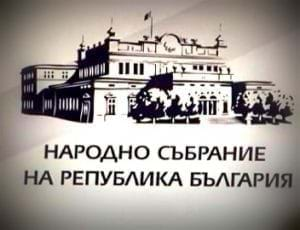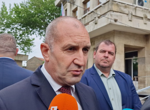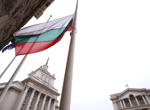--------------------------------------------------------------------
JOINT PARLIAMENTARY COMMITTEE
15th Meeting
29-30 October 2002
Sofia
Declaration and Recommendations
(adopted on 30 October 2002)
The EU-Bulgaria Joint Parliamentary Committee held its 15th Meeting in Sofia on 29 and 30 October 2002 under the Chairmanship of Mr. Daniel VALTCHEV (Party of the NMSS, Bulgaria) and Mr. Jos? Maria GIL-ROBLES GIL-DELGADO (EPP-ED, Spain). At this meeting, the Committee held an exchange of views with Mr. Solomon PASSI, Minister of Foreign Affairs, Mrs. Meglena KUNEVA, Minister of European Integration, and Mr. Milko KOVACHEV, Minister of Energy and Energy Resources, Mrs. Adriana TOSHEVA, Deputy Minister of Agriculture, on behalf of the Bulgarian Government, H.E. Ambassador Christian FABER-ROD, Ambassador of Denmark, on behalf of the Presidency-in-Office of the Council of the European Union, with Mrs. Anna DIAMANTOPOULOU, Member of the European Commission, and with Mr Christof STOCK, on behalf of the Head of the Commission Delegation in Sofia.
The Joint Parliamentary Committee addressed the following issues:
- the state of play of the accession negotiations of Bulgaria to the EU on the basis of the European Commission's Regular Report 2002;
- the agriculture in Bulgaria in the context of the negotiations on Chapter VII;
- the infrastructures and Corridor n° 8 (Durres - Varna) of the Trans-European Networks;
- the situation of the minorities in Bulgaria and integration of the Roma;
- the energy strategy of Bulgaria and the Kozloduy Nuclear Power Plant;
- the defence, security, and regional cooperation
The Joint Parliamentary Committee, in accordance with Rule 5 of its Rules of Procedure and Art. 112 of the EU-Bulgaria Association Agreement, addressed the following recommendations to the institutions of Bulgaria and of the European Union:
On the state of play of negotiations and the progress achieved toward Bulgaria’s accession to the EU
1. welcomed the progress achieved in the negotiations for accession of Bulgaria to the European Union with 22 chapters already provisionally closed; expressed its expectations that the Copenhagen European Council will adopt a roadmap including a timetable and an enhanced pre-accession strategy for Bulgaria; stressed in this respect the importance of the elaboration of clear principles and parameters reinforcing the financial aspects of Bulgaria’s pre-accession to the EU
2. welcomed the largely positive assessment contained in the Regular Report issued on 9 October 2002 by the European Commission; expressed satisfaction in particular for the adoption of the provisions which now allow a better implementation of non discrimination policies on grounds of sexual orientation and improve the legal framework for the fight against terrorism, organised crime and trafficking; recognised the progress accomplished in removing the discriminatory elements on sexual orientation and urged to continue on this way; encouraged the engagement of civil society (NGO’s) in implementation and delivery of policies; called on the Government and all the responsible administrative bodies to be attentive towards the risks of corruption and bribery in the sectors of customs and border controls
3. recommended to the Bulgarian Government to continue its efforts on the following issues, in relation to the political criteria:
a) improvement of the structure of the judiciary and of the system regarding the immunity of judges, prosecutors and investigators
b) further increase of the budget for the judiciary, which should also serve to tackle the serious backlog of work and the insufficient number of staff and administrative resources at the disposal of judges, in line with the recent legislative amendments
c) improvement of the selection procedures, careers management, independence protection and training systems for judges and prosecutors,
d) effective fighting, through the National Anti-Corruption Strategy, against corruption and bribery, which still is a cause for concern
e) improvement of the public administration’s capacity of planning, managing and controlling the expenditure of public funds,
f) introduction of a transparent and mandatory system for recruitment of officials with civil servant status in the public administration, improvement of the training given to officials, as well as of their accountability
g) prioritisation of substantial improvement in the conditions in institutions for social and psychiatric care, as well as of the institutions for childcare and the prisons since the conditions of children in institutions and their long term welfare are considered unsatisfactory; furthermore remained concerned about the welfare of people with mental disabilities who are in institutions and care homes which fail to meet international human rights standards
h) tackling the cases of mistreatment of people in police custody
i) tackling the trafficking in human beings and all forms of organised crime
4. welcomed the important Commission’s assessment that Bulgaria is a functioning market economy and should be able to cope with competitive pressure and market forces within the Union in the medium term, provided that it continues implementing its reform programme; commended Bulgaria for achieving a high degree of macroeconomic stability and for the further steps made in structural reforms, welcomed the accomplishment of important and complex privatisation operations and the introduction of a new procedure for private businesses; recommended in this respect to all the Bulgarian authorities to take care to the respect of procedures and transparency
5. advised the players concerned to take advantage of the new legislation for foreign direct investments to attract domestic and foreign investments by creating a more business-friendly framework
6. asked the Government and the Commission to concentrate on the problem of unemployment and of the grey economy as a matter of priority, especially when introducing new policies and when making decisions on the re-structuring of the economic sector and on competition
7. encouraged the efforts of the Bulgarian government in the field of pensions reform, but urged in this respect the responsible authorities to tackle effectively the implementation of these social reforms in order to ensure payment of sustainable pensions and to preserve the dignity of elderly people
On agriculture
8. called on the Commission to prepare, in the framework of the roadmap for Bulgaria to be presented at the Copenhagen European Council, a reference to clear parameters for the negotiation process with Bulgaria on the ‘Agriculture’ Chapter
9. considered that Bulgaria, with more than some 60 % of its total area being agricultural land and almost 40 % of its population living in rural areas, should be offered, especially on the way to EU accession, appropriate means and market access for achieving urgent modernisation leading to a better performance for its agricultural GDP, its share of employment in the sector, the volume, processing and marketing of its agricultural production and the rationalisation of the structure of the sector
10. recalled that Bulgaria still has to create a national cadastre and property register in order to improve the situation of the land market
On infrastructures and corridor no. 8
11. welcomed the European Commission’s assessment that Bulgaria is reinforcing its administrative structures in the area of transports and encouraged it to continue to strengthen its administrative capacity, in order to be able to implement its ambitious Programme for Transport Infrastructure Development and looked forward to overcoming the delays in restructuring the transport network, including the inland waterway sector.
12. welcomed the signature, on 9 September 2002, of a memorandum of Understanding on the development of corridor no. 8 which, crossing Bulgaria for more than the half of its length, will link the EU with the countries of the Caucasus and Central Asia, and will provide Bulgaria with an important instrument for its overall social and economic development, and called for improvements in administrative capacity to fully utilise the EU ISPA funds
13. stressed that infrastructure investments in the Balkans also constitute a fundamental investment in the security of the entire European continent
On the situation of minorities and on the integration of the Roma
14. expressed concern that in Bulgaria, like in other European societies, the Roma community continues to be most affected by social inequality and extremely difficult living conditions and encouraged the Government of Bulgaria to pursue new methods of social integration for the Roma, combining seasonal and temporary forms of employment with programmes for their education and training, whilst continuing to exploit to a maximum extent the PHARE pre-accession funds
15. urged the Bulgarian authorities to tackle effectively the cases of physical attacks and discrimination against Roma people, and to take the necessary administrative measures, including the legalisation of the properties of the Roma; supports the efforts to desegregate the education of the Roma children and calls for the integration of children with disabilities into the main stream education system
On energy
16. welcomed the adoption, in July 2002, of the Government Energy Strategy by the Bulgarian National Assembly, and expressed the hope that the re-structuring of the energy sector and energy efficiency will be the main criteria of its implementation, since at present the amount of energy consumption in Bulgaria is a point of concern
17. With regard to the Kozloduy Nuclear Power Plant, recalls the Memorandum of Understanding of 1999; notes the European Parliament’s resolution on the issue of June 2002; acknowledges the results of the IAEA report of June 2002 and takes note of the resolution of the Bulgarian Parliament of 2 October 2002; notes that during the visit of some members of the European Parliament to Kozloduy on 28 October 2002, they acknowledged the progress made by the Bulgarian authorities in regard to safety measures; looks forward to the expected peer-review by the EU Council’s Working Group on Nuclear Issues and calls on the Commission, the Council and the Bulgarian Government to constructively negotiate this issue.
On accession to NATO, fight against terrorism, regional stability and cooperation
18. congratulated Bulgaria for its continuous efforts for integration into the Euro-Atlantic structures and supported its application for NATO accession at the forthcoming NATO Summit in Prague, which could reinforce the capacity of the Alliance to carry out peace-keeping and humanitarian operations and counter terrorism whilst, at the same time, strengthening regional stability
19. congratulated Bulgaria for its work within the Stability Pact; indicated as a positive example the degree of cooperation of Bulgaria with its neighbouring countries
In conclusion
20. recalled that enlargement should be regarded as a dynamic political process, and not as a punctual operation; in order to help Bulgaria to fully play its own role in it, urged the European Union to maintain a strong commitment towards an inclusive political dialogue with Bulgaria
21. looked forward to the updated roadmap and to the revised and enhanced pre-accession strategy for Bulgaria, to be presented at the Copenhagen European Council, and recommended concentration on important milestones without the introduction of new conditions; recalled that reinforced pre-accession financial assistance is expected for Bulgaria, alongside the new roadmap
22. considered as realistic the objective of the Bulgarian Government to conclude the accession negotiations with the current Member–States of the European Union and noted in this respect the importance of a timely elaboration by the EU institutions of the financial aspects of Bulgaria’s accession to the Union
23. supported the view that the political link between the present and the future Member States of the EU and Bulgaria should be strongly reinforced as soon as the first decisions on enlargement will be made in December 2002, and took the view that the parliamentary dimension should play a most important role in this respect, through further cooperation between the Bulgarian and the European Parliament; stressed that Bulgaria, like other candidates, should be allowed to send observers to the European Parliament upon the signature of an accession treaty.
24. welcomed the European Commission's commitment in pursuing its assistance to Bulgaria and the European Council’s conclusions of 25 October 2002 on the irreversible nature of the enlargement process and its substantive support for Bulgaria’s effort to achieve the objective of membership in 2007.










